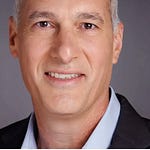A warm welcome to the 149 new subscribers who have joined since the last edition!
If you’re reading this and haven’t subscribed, sign up below to join a high-value community of over 1,600 climatetech entrepreneurs, investors, and industry leaders.
Here’s how The Green Techpreneur can help you:
For entrepreneurs
I interview extraordinary climatetech entrepreneurs and investors and share practical advice on how to build your business and find funding. It’s insightful, actionable and fun to read or listen to.
Do you want help with standing out to attract enquiries, talent & investors?
For details visit...becomemorevisible and book a call if it resonates.
For climatetech investors
The Green Techpreneur publishes lists of pre-vetted startups seeking investment. Subscribe to be the first to know.
“When written in Chinese, the word ‘crisis’ is composed of two characters. One represents danger and the other represents opportunity.” —John F. Kennedy
Few crises are as pertinent today as the energy dilemma as we enter what is looking to be a lean winter. With millions of Europe’s most vulnerable facing the option to ‘heat or eat’ without government intervention for unbearable energy costs, the vulnerability of nations that depend on autocratic regimes to meet their energy needs has been laid bare. Energy independence is an immediate matter of national security and an environmental and social necessity. But a time of great crisis can also be a time of great opportunity; this is proving true for the transition to renewable energy – a climatetech sector that’s seeing growth like never before.
Anthony Agnew, Development Director of Yoo Energy, a sustainable energy fund and developer, working in wind, solar and battery early stage projects in Western Europe, has worked in renewables for 12 years. His clients span the globe stretching from Greece, the UK, Spain, Italy, Zimbabwe and Holland to the US and Latin America.
Anthony first discovered an entrepreneurial streak while studying Mechanical Engineering at uni – along with a friend, he built and developed a vodka business which grew in popularity. Shots sold far beyond the university bar: “at its peak, we were employing 36 people and selling vodka in China. It was a fascinating, interesting time, but it wasn't really where my heart was. I always wanted to go into sustainable energy.”
His next venture – an attempt to commercialise construction technology – was stopped in its tracks by the 2008 crisis. But it turned out to be the bend in the road he needed to move into where his true passion lay. He took the cue and launched his journey into green techpreneurship. Anthony set up a renewable heat and power installing business including solar pv, solar thermal, biomass & heat pumps and went on to find his niche as an enabler for renewable energy projects: “with any sort of project development or funding it's a case of just putting people together and making it work – it's all these disparate parts that you can bring together to create value.”
This year, he says, has been pivotal for renewable energy; from new government policies to an acceleration of investment, technology and projects, momentum is without doubt on the side of renewables.
“It's not a case of investor sentiment is quiet, renewables have been one of the highest performing sectors globally and it's a part of the super cycle. All of the government policy points that are coming out are increasingly helping that.
“So whilst the initial invasion of Ukraine certainly caused a bit of a pause on things, two months later, people realised that actually, it's going to drive up those power prices and certainly for the medium to short term, those power prices are going to stay high – that's the expectation for the next couple of years.
“Renewable energy and power generation is countercyclical, so it doesn't go up and down as stocks do; we always need energy and energy demand is typically going up anyway. There's now a greater demand and a greater return on investment in renewable energy power projects.”
Where is the renewable market headed?
Long-term planning for renewable power has really stepped up as a result of these high fuel costs. If you look at the US’ anti-inflation bill, it’s all about sustainability. The impact that can have in the US is huge. So it’s really exciting to see these things come forward as a result of the world suffering and showing that we can address some of these issues.
We're certainly seeing on the project side, in delivering sustainable assets, huge influx and growth.
And the COP agendas are furthering that. We've already seen New Zealand in 2018 banning all new offshore rights. We saw Quebec this year in April ban all new oil and gas licences, which for Canada, one of the top five oil and gas producers globally, is an incredible thing to state. That's huge. This is the ball rolling, there's the carrot and sticks and we're seeing more and more of that coming.
And aside from being forever a hopeful optimist, I'm seeing as I work on the forefront of all these technologies, that deployment rates are quickly and continuously on the rise. So we're seeing more people want to do renewables, in more markets, and more money coming into it – the whole thing is just growing and growing.
Where do you think there's a lot of potential, both geographically, and in the type of renewable energy?
I hope we’ll see a bigger upsurge in concentrated solar power because when you store heat in liquid salts, you can run it for an extra 4-8 hours and potentially almost get 24-hour power generation. This can be hugely effective in high solar yield locations like southern Spain. Solar with battery, wind with battery, anything with batteries helps the market.
I think we can get to 80% renewables deployment, without baseload power. You've got baseload power, which is something that generates power 24/7, like a nuclear power station, and then you've got intermittent power, like wind and solar, which is only going to create power when the wind blows and the sun shines, and then the batteries work to balance the load on those intermittent powers.
I believe it's absolutely possible to switch to running the world using fully sustainable sources. It's just a question of building momentum and also building these large networks of people who come together to make it happen.
What do renewable developers often get wrong and how they can improve?
For project development, you need to derisk the project as much as you can and you need to have five things lined up:
1. It's all about taking as much risk off the table as you can.
The investors are looking at it in terms of how do we get it past our debt providers and past the board?
2. You need to have the land and agreements for it in its place
3. You need to have the proven energy resource
- which is going to be the sun, the wind, or the supply of waste from a waste plant.
4. You’ll need to have the build permits
5. You need to have grid connection
Once you've got those five things, you've created value and it's pretty much plain sailing, then it's just engineering and construction which isn't risk by comparison to the early stages.
A lot of it comes down to making sure those parts are done really well. It’s showing the expertise you need to to derisk whatever it is that you're trying to do; having local people who have local knowledge and connections and who know how to get those permits as well as specific technical knowledge. Once you put those two together, they're quite potent.
Do you have any tips on derisking projects and getting the messaging right?
A lot of it comes down to the message and story; making sure it's presented in the best way possible.
It's always worth understanding your own strengths and weaknesses, because an investor will know or understand what your weaknesses are likely to be. You can say, ‘look, I'm not good at this, we need to get this part and we've done everything else.’
Keep it simple, don't over complicate things. If you have too many words on an investment memorandum you're going to lose everyone because investors are looking at 10-15 of these a day.
What type of support is needed to further accelerate renewable uptake?
The boulder is already running downhill. We just need more people to push the boulder and get obstacles out of the way. We already have the technologies we need to deliver.
There are so many fantastic technologies coming into the market. One of my clients is working with a technology to separate methane into hydrogen. If you run methane through an electrolyser it creates water and electricity – fantastic stuff. And they are sequestering the carbon into high value graphene. Graphene is this bonkers wonderful material, 10 times stronger than diamond and more conductive than copper. You can add it to concrete as an additive and you can get rid of reinforcing steel, for example, or you can use 40% less concrete, because it's that much stronger. 40% less, that use case alone, if it was fully deployed in the industry would create a 2% saving globally on carbon.
You always need support from the government to make it happen. But right now, you can build solar in the UK purely based on the current market pricing, and that's before Ukraine happened. You can build these without any support and they make money, so it's already happening, that ball is rolling. If it makes more sense to put solar on your house than not put solar on your house because you're going to live in a house for six years, then suddenly the world gets covered in solar.
UBS, for example, are advising their private wealth clients that renewable energy is where you should invest not because you like sustainability, not because you believe in the environment, but because it's outperforming everything else. And that's the perfect news story.
Do you have a philosophy or a business mantra?
Do the hard thing first. I think the most important thing is just to do the next thing, whatever is in front of you, just take that step and keep going.
Are there any mentors who've been influential in helping you on this journey?
One of the biggest influences in my life has been my wife. She's a trained executive coach and Head of Philanthropy at Barclays Bank. Having someone who thinks that well and that clearly is a huge challenge in your relationship and it can be very hard to take that advice in, but when you can set the child aside and be a bit grown up, there’s also huge potential for growth. She's been a wonderful engine in how I see the world myself and trying to basically get out of my own way all the time.
What do you do when it’s time to unwind after work?
I've got a four year old son who's just gorgeous. So playing with him at the end of every day is fabulous. I love food – so we often go out to Borough market. I'm a massive feeder, so having people around for supper and creating and cooking is a huge pleasure for me.
💥 Find out how you can stand out to attract enquiries, talent & investors…
For details visit...becomemorevisible and book a call.
Check out these lists of pre-vetted startups seeking investment
Rhizome2 Hydrogen, Traceless, Utility Bridge, Everdye, Kyomei
Beworks Automation, Cultivated Bio, Phase Biolabs, Salient Energy
Further reading:
How Earthbanc is Helping Finance Mass Adoption of Land Regeneration
How to Transform Waste into Energy and End Fossil Fuel Dependency
www.thegreentechpreneur.uk














Share this post